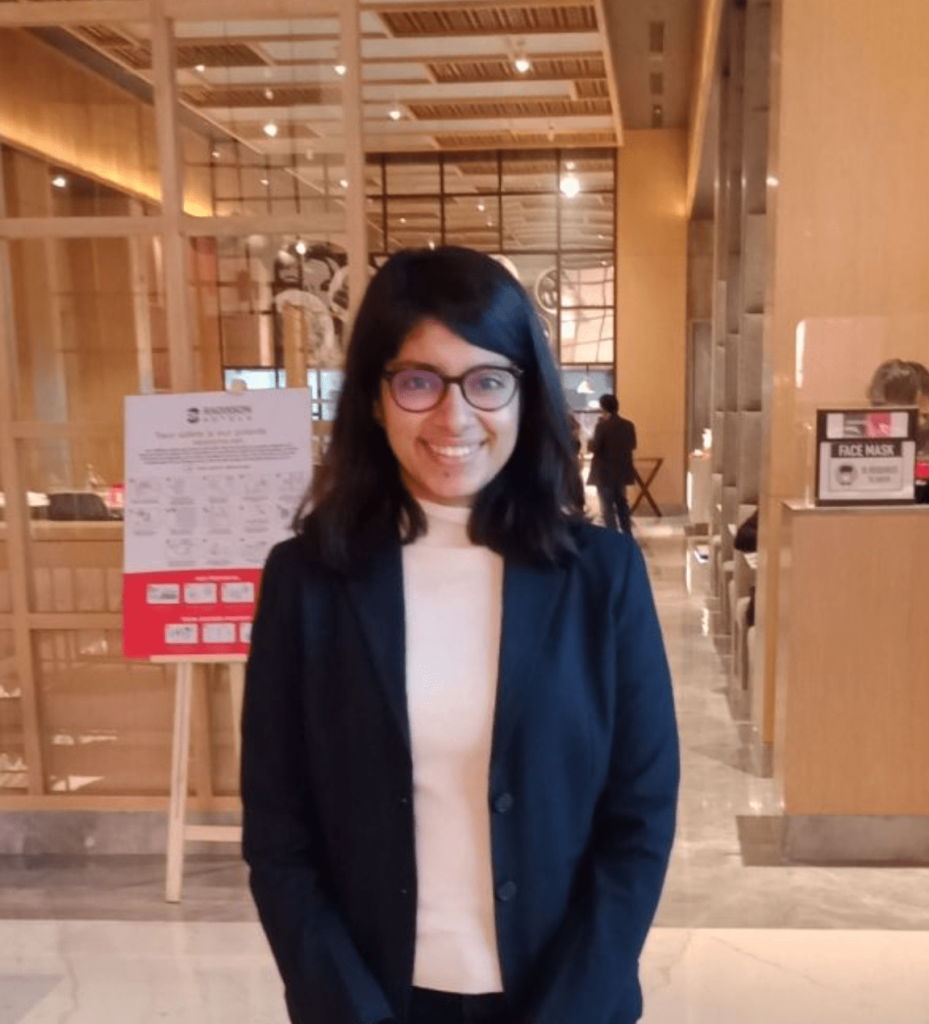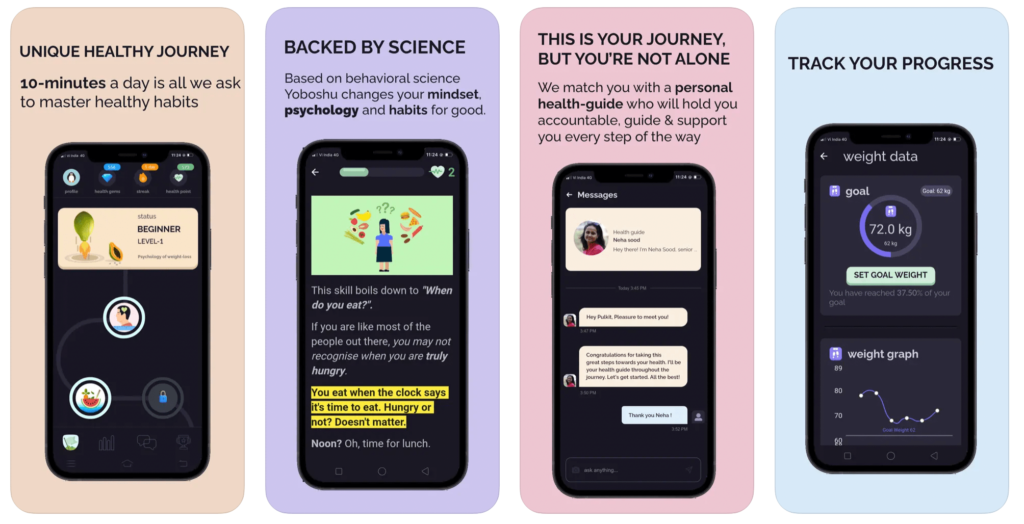In a world of fad diets and unrealistic weight-loss goals, Yoboshu Cares cuts through the market of weight management apps by combining behavioural science and habit-building to help users achieve long-term health outcomes. In this interview, young entrepreneur and co-founder Shivanshi Verma offers an insight into her philosophy, and her journey in unlocking the power of behavioural science.

Welcome, Shivanshi! Can you please tell us a bit about your background and the creation of Yoboshu?
I started Yoboshu two years ago when I was in the second year of college. My father had been dealing with issues such as high blood pressure for over eleven years, so I thought that I should do something about it – he can’t just keep taking medication for the rest of his life! That’s when I started Yoboshu alongside my co-founder Sandeep Kumar.
Welcome, Shivanshi! Can you please tell us a bit about your background and the creation of Yoboshu?
I started Yoboshu two years ago when I was in the second year of college. My father had been dealing with issues such as high blood pressure for over eleven years, so I thought that I should do something about it – he can’t just keep taking medication for the rest of his life! That’s when I started Yoboshu alongside my co-founder Sandeep Kumar.
Can you tell us about your individual role within the company?
I have adopted a lot of roles over the lifetime of the company – I was initially the developer; then I started building a team of nutrition and behavioural psychology experts, and now I’m primarily focused on customer satisfaction and feedback.
I’m figuring out whether the programme is making real changes in users’ lives or not. Whilst we have seen that the programme definitely works, there are always improvements to be made in the mode of delivery so that is what I take care of.

Was behavioural science always intended to be at the heart of the company?
The honest answer is no! We figured it out along the way.
Initially, we involved nutritionists and trainers and offered diet and exercise plans. We were making good money out of it but we were not addressing the core problem; diet and exercise were temporary fixes.
Soon enough, people reverted to their old lifestyles and regained the lost weight. In fact, research suggests that over 90% of dieters regain weight because simply following a diet does not lead to building habits! When we noticed this problem and the mental pressure that our customers were undergoing, we knew that we had to do something about it. That’s when behavioural science came into play. We paired it with other aspects of health to build healthy habits in the long term without restricting our customers.
It has been very interesting to understand that this aspect was incorporated into the company at a later stage. Since it was new to you, how did you approach it?
Of course, it was a challenge to implement it because it is healthcare, we can’t just Google it and put it out there! It has to be well researched and scientifically backed. I myself am from an engineering background and my co-founder is from an aeronautical engineering background. We had no relationship with behavioural science but we had read quite a few books on it. We then got Kirti Tyagi involved, who is currently leading our psychology team. She had the same enthusiasm for behavioural science and health as we did! We combined this expertise with more people from psychology, physical activity, and nutrition backgrounds, and developed our programme after over six months of research.
Were there any particular books or pieces of research that helped you understand and incorporate behavioural science into your work?
Books such as Atomic Habits and The Power of Habits helped us discover how powerful habits are at the very start of our journey. Once you learn the habit, things become flawless. For example, you don’t need a reminder to brush your teeth because it is a habit. That’s when we got deeper into behavioural psychology, started reading research articles and books, and incorporated it into the programme.
As you mentioned that behavioural science was not a part of your original plan, did anything stand out and surprise you when you started incorporating it into your work?
Yes, when we compared dieting with habit-building, we noticed that habit-building impacted ease of use as well as mental health.
If users are dieting, they are restricted to a diet plan which disregards their choices. This places them under a lot of mental pressure. Alternatively, if our users build healthy habits, things start to flow and they don’t need to put huge amounts of effort and energy into restricting themselves. This has been a major finding after incorporating behavioural science into our work.
What do you do to ensure that your users don’t feel restricted?
Our top rule is that we don’t restrict anybody; you can eat whatever you want. We focus on other aspects such as how to eat when to eat, and how to lead a balanced lifestyle.
These aspects are just as important as what to eat. The programme teaches users how to deal with stressors, emotional eating, triggers, cravings, or even going out to eat in restaurants.
We also cover other factors such as physical activity, sleep, and state of mind. These four factors make up the pillars of health, and addressing all of them together helps us guide our users towards healthy habit-building.
Can you tell us a bit more about how you encourage your customers to build healthy habits? What methods do you use?
Users go through the interactive content that we have put together for them, simply read and apply it, and engage with the health trackers on the app. We additionally use CBT to strengthen the habits that the users are building.
The programme is made to fit into the lives of busy people so all they have to do is give us 5-10 minutes of their day at max. This means that anybody can integrate these behaviours into their daily lives without hassle.
To follow up on that, how exactly do you measure this habit-building and the outcomes?
That’s a great question! Along with the programme, we assign a health coach who is experienced in the field of weight management. Their role is to keep the customers accountable for their actions and encourage them to engage with the programme. Additionally, the programme offers various checklists and health trackers that can determine which behaviours users are implementing into their routine. If the users are struggling to implement certain things, they get suggestions on how to go about it and how to build a habit of it.
That’s very interesting to hear, and it seems like you have built a great platform!
These days, apps aim to grab the users’ attention more and more. As this is a health product you must have to make some conscious decisions to ensure that the app doesn’t become a part of the problem. So I’d like to know; who manages the product and what is your design philosophy?
My co-founder Sandeep looks after the product and the design. Our philosophy was to create a whole gamified journey because gamifying a process makes it easier to form any habit! The app creates a path whereby new aspects are gradually unlocked. As the user progresses, they level up and get various badges, health points, and health tips on the way. They can only unlock one level each day and they can’t access the whole programme at once. So we have tried hard to make the platform fun and engaging!
We are now formulating tangible ways for users to use those health points and contribute to social causes. For example, users will be able to use their health points to plant a tree or donate items to orphans through Yoboshu. These are our current ideas and we are continuing to brainstorm how we can use health points further.
Thank you so much for sharing that. It’s fascinating that the incentives are geared towards social and environmental benefits rather than personal gain. It sounds like a wonderful initiative!
You also have another programme regarding mental health in the works. What are the ideas behind that?
The number of individuals whose mental health has suffered post-Covid has increased. Some people ignore this issue, some don’t even realise it, and some may be afraid to seek help. Within this programme, people would be able to address their mental health needs whilst still maintaining their anonymity and they wouldn’t have to answer to anybody!
Will you continue to keep habit-building and behavioural science at the core of this new mental health programme?
Yes, habits and a balanced life are the keys. Emotions are bound to fluctuate up and down but we can learn how to deal with them in a consistently better way.
Do you have any final thoughts and tips for those aiming to enter the behavioural science field?
Yes, I feel that people who are doing Masters or PhDs in psychology and behavioural science don’t always realise the potential of it, and often tend to go for content-writing or marketing jobs without looking further. Explore this power because it can do wonders – not only in health but in multiple different areas if used properly. More and more people should start using behavioural psychology in their everyday lives, I believe it would improve the lives of lots of people!
I would also want people to start building habits and stop dieting if they are looking to manage their health because building habits is the key to a healthy lifestyle. There is no temporary fix, it doesn’t work!